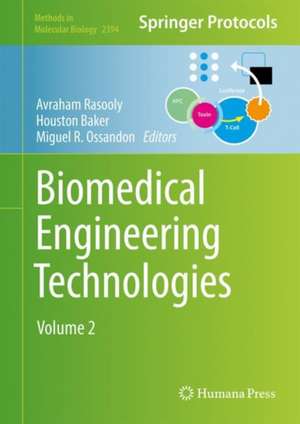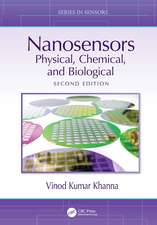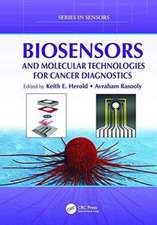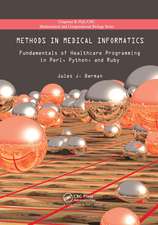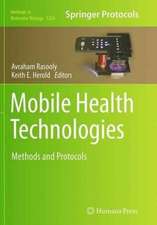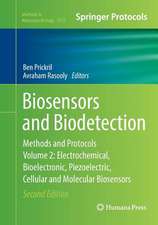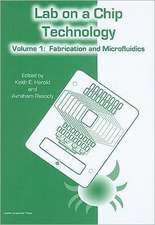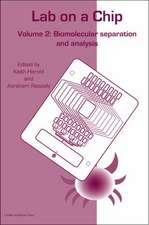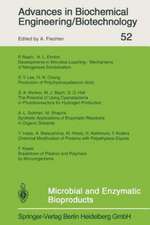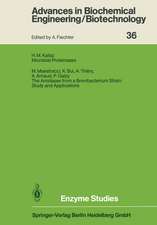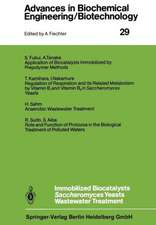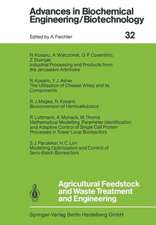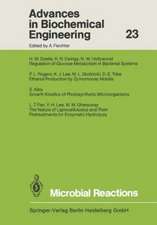Biomedical Engineering Technologies: Volume 2: Methods in Molecular Biology, cartea 2394
Editat de Avraham Rasooly, Houston Baker, Miguel R. Ossandonen Limba Engleză Hardback – 31 ian 2022
Authoritative and practical, Biomedical Engineering Technologies, Volume 2 provides technical details in descriptions of major technologies by experts in the field.
| Toate formatele și edițiile | Preț | Express |
|---|---|---|
| Paperback (2) | 985.24 lei 43-57 zile | |
| Springer Us – feb 2023 | 985.24 lei 43-57 zile | |
| Springer Us – 28 noi 2022 | 1585.03 lei 43-57 zile | |
| Hardback (2) | 1422.45 lei 43-57 zile | |
| Springer Us – 31 ian 2022 | 1422.45 lei 43-57 zile | |
| Springer Us – 27 noi 2021 | 2135.11 lei 43-57 zile |
Din seria Methods in Molecular Biology
- 9%
 Preț: 791.63 lei
Preț: 791.63 lei - 23%
 Preț: 598.58 lei
Preț: 598.58 lei - 20%
 Preț: 882.98 lei
Preț: 882.98 lei -
 Preț: 252.05 lei
Preț: 252.05 lei - 5%
 Preț: 802.70 lei
Preț: 802.70 lei - 5%
 Preț: 729.61 lei
Preț: 729.61 lei - 5%
 Preț: 731.43 lei
Preț: 731.43 lei - 5%
 Preț: 741.30 lei
Preț: 741.30 lei - 5%
 Preț: 747.16 lei
Preț: 747.16 lei - 15%
 Preț: 663.45 lei
Preț: 663.45 lei - 18%
 Preț: 1025.34 lei
Preț: 1025.34 lei - 5%
 Preț: 734.57 lei
Preț: 734.57 lei - 18%
 Preț: 914.20 lei
Preț: 914.20 lei - 15%
 Preț: 664.61 lei
Preț: 664.61 lei - 15%
 Preț: 654.12 lei
Preț: 654.12 lei - 18%
 Preț: 1414.74 lei
Preț: 1414.74 lei - 5%
 Preț: 742.60 lei
Preț: 742.60 lei - 20%
 Preț: 821.65 lei
Preț: 821.65 lei - 18%
 Preț: 972.30 lei
Preț: 972.30 lei - 15%
 Preț: 660.49 lei
Preț: 660.49 lei - 5%
 Preț: 738.41 lei
Preț: 738.41 lei - 18%
 Preț: 984.92 lei
Preț: 984.92 lei - 5%
 Preț: 733.29 lei
Preț: 733.29 lei -
 Preț: 392.60 lei
Preț: 392.60 lei - 5%
 Preț: 746.26 lei
Preț: 746.26 lei - 18%
 Preț: 962.66 lei
Preț: 962.66 lei - 23%
 Preț: 860.22 lei
Preț: 860.22 lei - 15%
 Preț: 652.64 lei
Preț: 652.64 lei - 5%
 Preț: 1055.50 lei
Preț: 1055.50 lei - 23%
 Preț: 883.87 lei
Preț: 883.87 lei - 19%
 Preț: 491.89 lei
Preț: 491.89 lei - 5%
 Preț: 1038.86 lei
Preț: 1038.86 lei - 5%
 Preț: 524.16 lei
Preț: 524.16 lei - 18%
 Preț: 2122.34 lei
Preț: 2122.34 lei - 5%
 Preț: 1299.23 lei
Preț: 1299.23 lei - 5%
 Preț: 1339.12 lei
Preț: 1339.12 lei - 18%
 Preț: 1390.26 lei
Preț: 1390.26 lei - 18%
 Preț: 1395.63 lei
Preț: 1395.63 lei - 18%
 Preț: 1129.65 lei
Preț: 1129.65 lei - 18%
 Preț: 1408.26 lei
Preț: 1408.26 lei - 18%
 Preț: 1124.92 lei
Preț: 1124.92 lei - 18%
 Preț: 966.27 lei
Preț: 966.27 lei - 5%
 Preț: 1299.99 lei
Preț: 1299.99 lei - 5%
 Preț: 1108.51 lei
Preț: 1108.51 lei - 5%
 Preț: 983.76 lei
Preț: 983.76 lei - 5%
 Preț: 728.16 lei
Preț: 728.16 lei - 18%
 Preț: 1118.62 lei
Preț: 1118.62 lei - 18%
 Preț: 955.25 lei
Preț: 955.25 lei - 5%
 Preț: 1035.62 lei
Preț: 1035.62 lei - 18%
 Preț: 1400.35 lei
Preț: 1400.35 lei
Preț: 1422.45 lei
Preț vechi: 1734.69 lei
-18% Nou
Puncte Express: 2134
Preț estimativ în valută:
272.22€ • 283.15$ • 224.73£
272.22€ • 283.15$ • 224.73£
Carte tipărită la comandă
Livrare economică 14-28 aprilie
Preluare comenzi: 021 569.72.76
Specificații
ISBN-13: 9781071618103
ISBN-10: 1071618105
Pagini: 910
Ilustrații: XXIII, 910 p. 290 illus., 241 illus. in color.
Dimensiuni: 178 x 254 mm
Greutate: 1.63 kg
Ediția:1st ed. 2022
Editura: Springer Us
Colecția Humana
Seria Methods in Molecular Biology
Locul publicării:New York, NY, United States
ISBN-10: 1071618105
Pagini: 910
Ilustrații: XXIII, 910 p. 290 illus., 241 illus. in color.
Dimensiuni: 178 x 254 mm
Greutate: 1.63 kg
Ediția:1st ed. 2022
Editura: Springer Us
Colecția Humana
Seria Methods in Molecular Biology
Locul publicării:New York, NY, United States
Cuprins
Development of a Multi-Target Protein Biomarker Assay for Circulating Tumor Cells.- Method to Isolate Dormant Cancer Cells from Heterogeneous Populations.- Label-Free Morphological Phenotyping of in vitro 3D Micro Tumors.- High-throughput microenvironment microarray (MEMA) (file #high-resolution imaging.- Real-Time Analysis of AKT Signaling Activities at Single-Cell Resolution Using Cyclic Peptide-Based Probes.- Microfluidic device technologies for digestion, disaggregation, and filtration of tissue samples for single cell applications.- Microdissection methods utilizing single cell subtype analysis and the impact on precision medicine.- Functionalized lineage tracing for the study and manipulation of heterogeneous cell populations.- Fluorescence lifetime imaging probes for cell-based measurements of enzyme activity.- Assessment of intracellular GTP levels using genetically encoded fluorescent sensors.- Node-Pore Sensing for characterizing cells and extracellular vesicles.- Affinity-Based Enrichment of Extracellular Vesicles with Lipid Nanoprobes.- Droplet magnetofluidic assay platform for quantitative methylation-specific PCR.- Droplette: A Platform Technology to Directly Deliver Nucleic Acid Therapeutics and Other Molecules into Cells and Deep into Tissue Without Transfection Reagents.- Molecular imaging of HER2 in patient tissues with touch prep-quantitative single molecule localization microscopy.- Microchip free-flow electrophoresis for bioanalysis, sensing and purification.- Green Chemistry Preservation and Extraction of Biospecimens for Multi-omic Analyses.- TdT-UTP DSB End Labeling (TUDEL), for Specific, Direct in situ Labeling of DNA Double Strand Breaks.- Ligand-directed GPCR Antibody Discovery.- Self-Induced Back-Action Actuated Nanopore Electrophoresis (Sane) (File #Sensor For Label-Free Detection Of Cancer Immunotherapy-Relevant Antibody-Ligand Interactions.- Incorporating, quantifying, and leveraging noncanonical amino acids in yeast.- Nuclease-assisted, multiplexed minor-allele enrichment: application in liquid biopsy of cancer.- Implementation of Ion Mobility Spectrometry-Based Separations in Structures for Lossless Ion Manipulations (SLIM).- Pleural Effusion Aspirate for use in 3D Lung Cancer Modeling and Chemotherapy Screening.- Using Optical Tweezers to Dissect Allosteric Communication Networks in Protein Kinases.- Focused ultrasound-mediated intranasal brain drug delivery technique (FUSIN).- Extracellular pH mapping as therapeutic readout of drug delivery in glioblastoma.- Charge-Based Multi-Arm Avidin Nano-construct as a Platform Technology for Applications in Drug Delivery.- Chemical Modification of Proteins and Their Intracellular Delivery Using Lipidoid Nanoparticles.- Generation of Membrane-derived Nanovesicles by Nitrogen Cavitation for Drug Targeting Delivery and Immunization.- Laboratory-scale production of sterile targeted microbubbles.- Adeno-associated viral vector immobilization and local delivery from bare metal surfaces.- Decellularization and Recellularization Methods for Avian Lungs: An Alternative Approach for Use in Pulmonary Therapeutics.- Methods for Forming Human Lymphatic Microvessels In Vitro and Assessing Their Drainage Function.- Polymer Based Micro-Nanostructured Scaffolds for Bone Tissue Engineering.- Biodegradable electrospun nanofibrous scaffolds for bone tissue engineering.- Bio-Tribometer for the Assessment of Cell and Tissue Toxicity of Orthopedic Metal Implant.- Methods for Quantifying Neutrophil Extracellular Traps on Biomaterials.- In Vivo Imaging of Implanted Hyaluronic Acid Hydrogel Biodegradation.- Computational modeling and simulation to quantify the effects of obstructions on the performance of ventricular catheters used in hydrocephalus treatment.- Selection of Cancer Stem Cell--targeting Agents Using Bacteriophage Display.- Nano-Scintillator-Based X-Ray Induced Photodynamic Therapy.- Methods to measure the inhibition of ABCG2 transporter and ferrochelatase activityto enhance aminolevulinic acid-protoporphyrin IX fluorescence-guided tumor detection and resection.- Macroscopic Fluorescence Lifetime Imaging for Monitoring of Drug-Target Engagement.- Tumor in vivo Imaging with a New Peptide-based Fluorescent Probe.- Thermal Ablation Treatment for Cervical Precancer (Cervical Intraepithelial Neoplasia grade 2 or higher [CIN2+]).- Employing Novel Porcine Models of Subcutaneous Pancreatic Cancer to Evaluate Oncological Therapies.
Textul de pe ultima copertă
This volume provides detailed technical protocols on current biomedical technologies and examples of their applications and capabilities. Chapters focus on molecular and cellular analytical methods, experimental new drug delivery approaches, guided surgery, implants and tissue engineering. Written in the format of the highly successful Methods in Molecular Biology series, each chapter includes an introduction to the topic, lists necessary materials and reagents, tips on troubleshooting and known pitfalls, and step-by-step, readily reproducible protocols.
Authoritative and practical, Biomedical Engineering Technologies, Volume 2 provides technical details in descriptions of major technologies by experts in the field.
Authoritative and practical, Biomedical Engineering Technologies, Volume 2 provides technical details in descriptions of major technologies by experts in the field.
Caracteristici
I?ncludes cutting-edge methods and protocols Provides step-by-step detail essential for reproducible result Contains key notes and implementation advice from the experts
